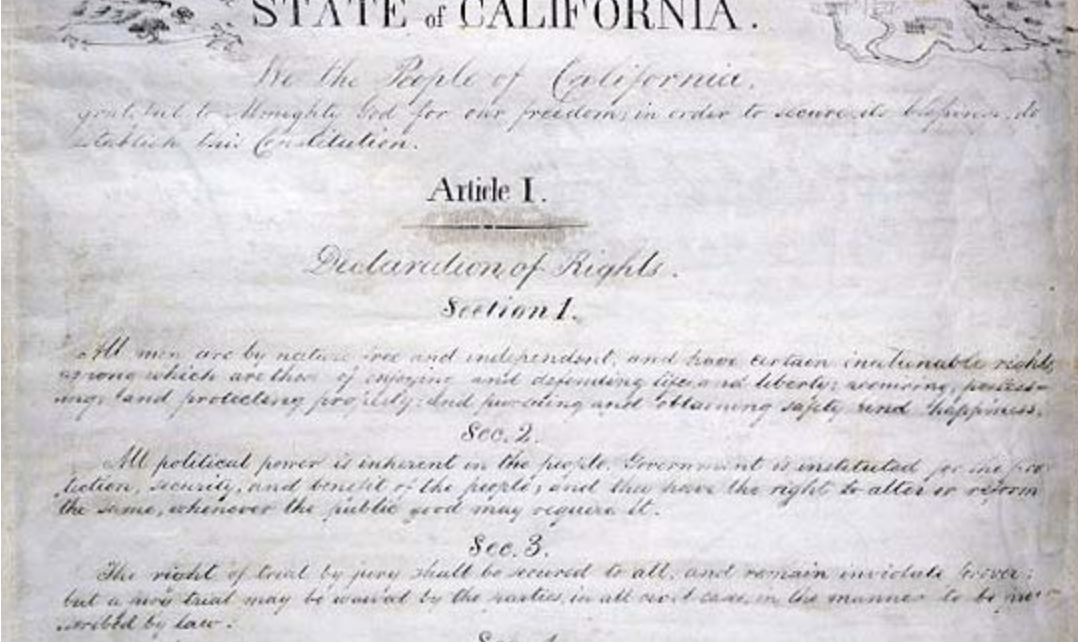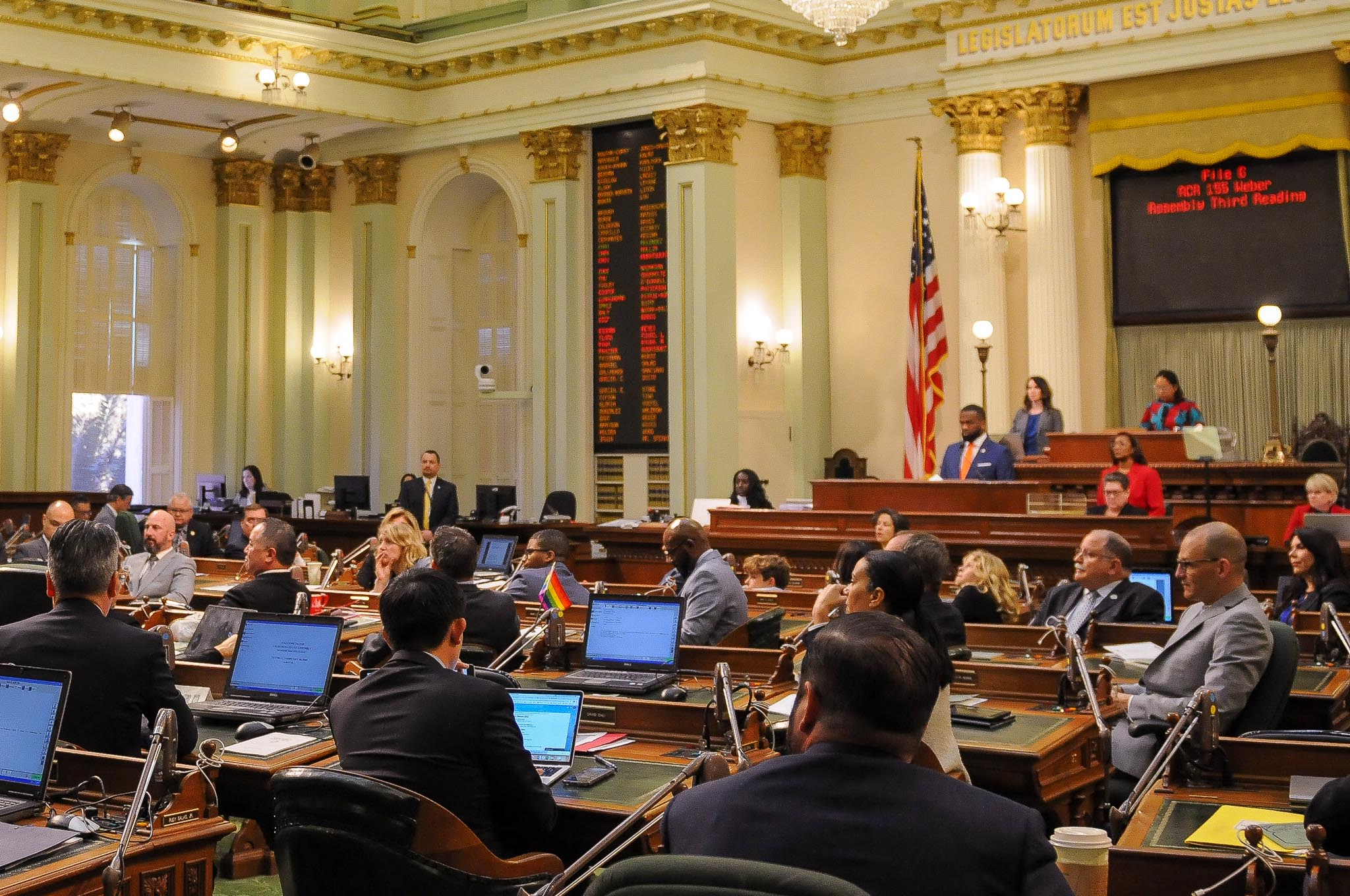
California Constitution. (Photo: www.sos.ca.gov)
California Courts and Budget-related Bills
How have California courts interpreted this section of state law?
By Chris Micheli, January 3, 2025 2:30 am
California’s Constitution, in Article IV, Section 12, provides for a majority vote for the approval of budget-related appropriations bills. How have California courts interpreted this section of state law?
“Plaintiffs next argue Assembly Bill 1X 26 does not constitute a bill providing for appropriations “relat[ing] to the budget bill” under amendments to Article IV, section 12, which were added to the Constitution following the voters’ approval of Proposition 25. As amended, Article IV, section 12 provides that such bills may be passed by a majority vote of the Legislature. (Art. IV, § 12(d) & (e).) Finding Assembly Bill 1X 26 falls within the constitutional language added by the amendments, we reject plaintiffs’ contention.”
As you may be aware, prior to Proposition 25, a two-thirds supermajority of the Legislature was required to pass the annual budget. That changed in November 2010 when voters approved Proposition 25, known as the “On-Time Budget Act of 2010.” Proposition 25 added language to existing subdivision (d) and added new subdivision (e) to section 12 of Article IV.
As a result, Article IV, section 12(d) now reads: “No bill except the budget bill may contain more than one item of appropriation, and that for one certain, express purpose. Appropriations from the General Fund of the State, except appropriations for the public schools and appropriations in the budget bill and in other bills providing for appropriations related to the budget bill, are void unless passed in each house by rollcall vote entered in the journal, two-thirds of the membership concurring.” (Art. IV, § 12(d) [language added by Prop. 25 in italics].)
Article IV, section 12(e)(1) further explains: “Notwithstanding any other provision of law or of this Constitution, the budget bill and other bills providing for appropriations related to the budget bill may be passed in each house by rollcall vote entered in the journal, a majority of the membership concurring, to take effect immediately upon being signed by the Governor or upon a date specified in the legislation.” (Art. IV, § 12(e)(1).) Subdivision (e)(2) now states: “For purposes of this section, `other bills providing for appropriations related to the budget bill’ shall consist only of bills identified as related to the budget in the budget bill passed by the Legislature.”
The appellate court explained, “Because we are tasked with construing the meaning of the Constitution, as amended by the electorate in Proposition 25, our overarching goal is to interpret the words so as to effectuate the electorate’s intent. (People v. Elliott (2005) 37 Cal.4th 453, 478) The same general principles regarding statutory construction apply. (Ibid.) We begin with the plain meaning of the words chosen, and if the plain meaning is not apparent, we look to extrinsic aids such as the purpose of the amendment, the evil to be remedied, the policy to be achieved, and analyses and arguments contained in official ballot materials. (Ibid.)
“In this case, Proposition 25 expressly defined the meaning of ‘other bills providing for appropriations related to the budget bill.’ (Art. IV, § 12(e)(2).) As defined, the phrase means ‘only of bills identified as related to the budget in the budget bill passed by the Legislature.’ Here, Assembly Bill 1X 26 appropriates $500,000 to the Department of Finance from the General Fund for administrative costs associated with the act and declares that it is a budget-related bill. (Stats. 2011, 1st Ex. Sess. 2011-2012, ch. 5, § 11.) Section 16 of the act provides: ‘This act is a bill providing for appropriations related to the Budget Bill within the meaning ofsubdivision (e) of Section 12 of Article IV of the California Constitution, has been identified as related to the budget in the Budget Bill, and shall take effect immediately.’ (Stats. 2011, 1st Ex. Sess. 2011-2012, ch. 5 § 16.)
“Senate Bill No. 87 (2011-2012 1st Ex. Sess.), the Budget Bill for 2011, specifically identifies Assembly Bill 1X 26 as one of many other bills providing for appropriations related to the Budget Bill. (Sen. Bill No. 87 (2011-2012 1st Ex. Sess.) enacted as Stats. 2011, 1st Ex. Sess. 2011-2012, ch. 33, § 39.00 [“The Legislature hereby finds and declares that the following bills are other bills providing for appropriations related to the Budget Bill within the meaning of subdivision (e) of Section 12 of Article IV of the California Constitution . . . ABX1 26. . ..”].)
“Assembly Bill 1X 26 thus contains an appropriation and is identified as being related to the budget in the Budget Bill. Under the plain language added by Proposition 25, then, Assembly Bill 1X 26 qualifies as an “`other bill [] providing for appropriations related to the budget bill'” within the meaning of Article IV, section 12(e). (See Matosantos I, supra, 53 Cal.4th at p. 254 [“`”we do not look to the Constitution to determine whether the legislature is authorized to do an act, but only to see if it is prohibited”‘”]; County of Riverside v. Superior Court (2003) 30 Cal.4th 278, 284 [132 Cal.Rptr.2d 713, 66 P.3d 718].)
“To avoid this outcome, plaintiffs urge us to read an implied limitation into the meaning of other bills providing for appropriations that are ‘related to the budget bill.’ They argue that an appropriation bill only ‘relate[s] to the budget bill’ for purposes of Proposition 25 if its fiscal impact is limited to the current budget year. An appropriation bill would not qualify for majority approval under Article IV, section 12(e), in their view, if it has any collateral effects that extend beyond the current year. To this end, because Assembly Bill 1X 26 has impacts beyond fiscal year 2011-2012 since it dissolved redevelopment agencies and effectively dismantled the Community Redevelopment Law it was not ‘related to’ the Budget Bill within the meaning of Article IV, section 12(e)(2).
“Plaintiffs cite no authority imposing such an implied limitation under Article IV, section 12(e), however. And our own research has located none.
“Our own Supreme Court has recognized, “`[r]elated’ is a commonly used word with a broad meaning that encompasses a myriad of relationships.” (Bay Cities Paving & Grading, Inc. v. Lawyers’ Mutual Ins. Co. (1993) 5 Cal.4th 854, 868) “[A] word with a broad meaning or multiple meanings may be used for that very reason—its breadth—to achieve a broad purpose.” (Ibid.) Interpreting Article IV, section 12(e) in the manner plaintiffs suggest ignores the breadth of the phrase “relate to.”
“At a minimum, plaintiffs’ preferred definition places an intolerable burden on the legislative process. If, as plaintiffs suggest, an appropriations bill only qualifies as “related to the budget” if it lacks any effects beyond that budget year, the result would be a continual conflict over whether the proper scope of an appropriations bill was exceeded. If any potential effects could be identified, the appropriations bill would not qualify, even if it clearly had a demonstrated connection with the budget bill in the given year.”
As a result of this decision, a budget bill junior or a budget trailer bill can readily “relate to” the budget bill. It does so by containing at least a nominal appropriation and being listed in the budget bill.
- Insignia of Nonprofit Associations - February 19, 2026
- Endangered Species Regulation - February 19, 2026
- Renewal of Judgments - February 18, 2026




